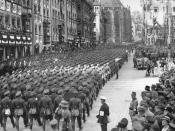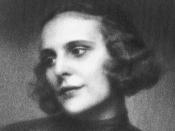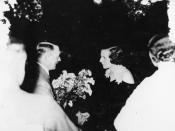Leni Riefenstahl- actress and dancer or master of propaganda and Nazi sympathiser? If Leni herself is to be believed she is a talent seduced with no political leanings, but how credible is she? The film's Leni made under the Nazi Regime are undoubtedly supportive of the Nazi ideology even if Leni's view that she acted out of self-interest in acting and dancing is to be believed. Although primary sources, Leni's claims after the war that she was no more than artist who did what Hitler had asked if her to the best of her ability, are clouded in controversy as surely, she would have much more to lose had she claimed otherwise.
Riefenstahl's career as a dancer was short-lived as she sustained a knee injury that would lead her to pursue acting. She starred in Arnold Fanck's physically demanding mountain films where she demonstrated her determined nature, ability to succeed in a male dominated world and her self-professed main character trait, "strength of will."
It would not be long before Leni tried her hand at directing and in 1932 "The Blue Light" was released- written, directed and starring Leni Riefenstahl.
The film would make such an impression that Hitler and propaganda minister Geobbels, would invite her to make films for the Nazi party- an offer that Geobbels diaries describe as being met with much enthusiasm by Leni.
The resulting film was Victory of Faith, made in 1933 of the first Party Rally since Hitler had seized power. It was, however, the Nuremberg rallies that would make Riefenstahl a star. Originally, Leni was to collaborate with Walter Ruttmann but as he envisioned a film where Hitler wasn't the sole focus, Hitler handed complete control to Leni. With forty cameramen and thousands of extras at her disposal Leni produced a technical masterpiece...


